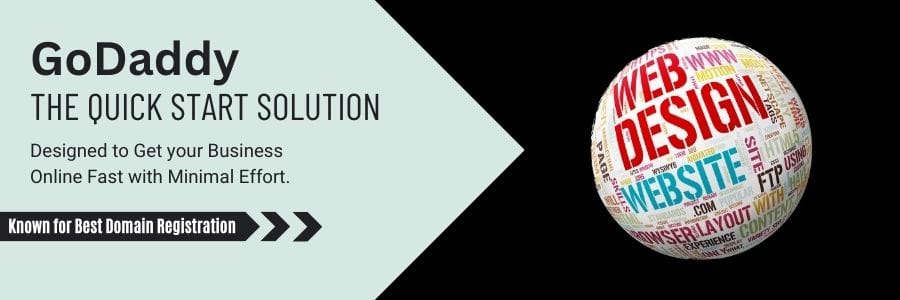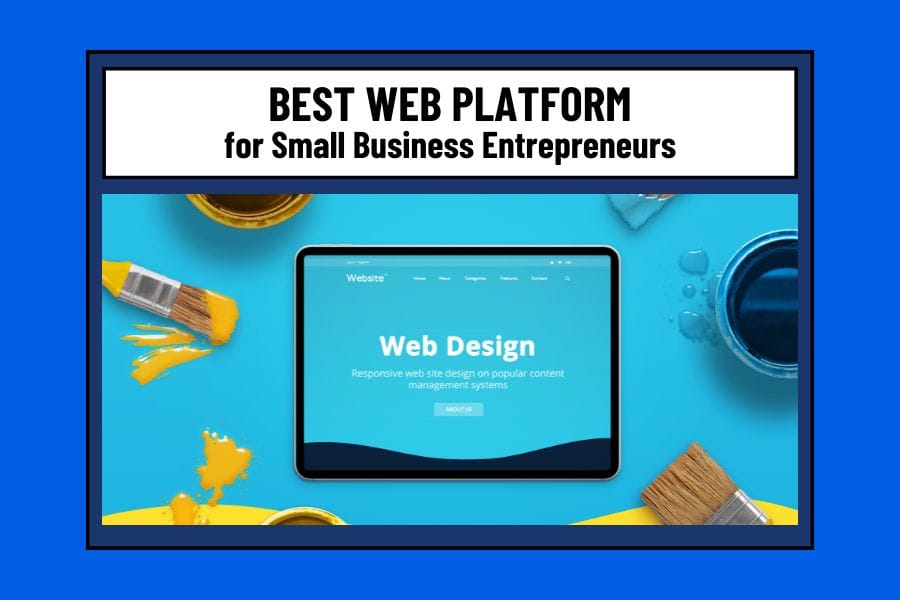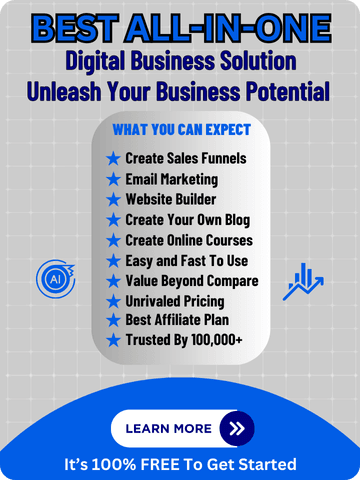Best web platform for small business: Comparing WordPress, Wix, Squarespace, Weebly, GoDaddy, Shopify & Systeme.io to find the perfect solution for your business!
Introduction
Why Choosing the Right Web Platform Matters
Imagine this: you’ve got a brilliant idea for your small business, and you’re ready to share it with the world. But where do you start? In today’s digital landscape, your website is the cornerstone of your success. Choosing the best web platform for small business can make all the difference—it’s not just about having an online presence; it’s about building a platform that attracts customers, engages them, and drives revenue. With the right platform, you can stand out from the crowd, but with the wrong one, you risk wasting time, money, and energy.
Challenges Small Business Owners Face
As a small business owner, you’ve probably faced your fair share of challenges. Tight budgets, limited technical skills, and the constant evolution of digital tools can make building an effective online presence feel like climbing a mountain. But it doesn’t have to be this hard. The good news? You don’t need to be a tech wizard or have a huge marketing budget to create a website that works for your business—you just need the right tools.
Purpose of This Post
In this post, we’ll take a deep dive into seven of the top web platforms: WordPress, Wix, Squarespace, Weebly, GoDaddy, Shopify, and Systeme.io. You’ll learn what makes each platform unique, how much they cost, their standout features, and their pros and cons. By the end, you’ll have all the information you need to confidently choose the platform that fits your business goals and budget. Remeber first impressions are critical, your target audience wants a user-friendly website experience that provides real value. Let’s get started!
NOTE: The features and pricing details for each web tool analyzed in this post are based on our research as of the time of publication. However, these details are subject to change and may vary over time. Readers are encouraged to verify the most up-to-date information directly on the respective company’s website.
WordPress: The Versatile Powerhouse

Overview of WordPress
When it comes to the best web platform for small business, WordPress stands out as a powerhouse. It’s the most widely used platform globally, trusted by over 40% of websites. Why? Because it’s incredibly flexible and highly customizable, making it ideal for businesses of all sizes. But here’s the catch: WordPress isn’t just one platform—it’s two. WordPress.com is the hosted version, perfect for beginners with its ready-to-use setup. Meanwhile, WordPress.org is self-hosted, offering complete control and customization but requiring a little more technical know-how. Whether you want something simple or fully tailored, WordPress delivers options that adapt to your business needs.
Features and Functionality
WordPress thrives on its extensive plugin library—over 60,000 plugins to be exact. This means you can add virtually any feature to your site without needing coding skills. Need a booking system? Done. Want to turn your website into an e-commerce powerhouse? There’s a plugin for that, too. Beyond plugins, WordPress is famous for its SEO capabilities, making it easier for your business to rank higher and attract customers organically. Its flexibility ensures that whether you’re building a blog, portfolio, or online store, WordPress can grow and adapt with your business, meeting every need along the way.
Pricing
One of the reasons WordPress is often considered the best web platform for small business is its affordability. At its core, WordPress offers a free plan, but there’s more to consider. While the WordPress free pricing is appealing, you’ll likely need to budget for additional essentials like a domain name, hosting (typically $3–$10 per month), premium themes, and plugins. These costs can add up depending on the tools you choose, but the value WordPress provides makes it a cost-effective choice for businesses looking to scale.
Pros and Cons
The WordPress pros and cons highlight why it’s such a compelling option. On the plus side, its flexibility allows you to customize every detail, and it’s scalable, meaning it can grow alongside your business. Additionally, you maintain full control over your website—something many platforms don’t offer. However, this control comes with a learning curve. For beginners, navigating WordPress.org can feel overwhelming at first, and you may need some time (or professional help) to get your site running seamlessly.
WordPress is a smart choice if you’re looking for customization, scalability, and control to build a professional website that grows with your business. But if simplicity and speed are your priorities, let’s dive into Wix, an intuitive, user-friendly alternative designed for non-tech-savvy entrepreneurs.
Wix: The User-Friendly Builder

Overview of Wix
When simplicity and ease of use top your list of priorities, Wix might just be the best web platform for small business owners like you. Designed with non-tech-savvy entrepreneurs in mind, Wix offers a drag-and-drop builder that makes creating a professional website feel effortless. You don’t need to know a single line of code—just click, drag, and customize. Whether you’re building your first website or looking for a fast solution to get your business online, Wix’s tech solutions empowers you to bring your vision to life without the technical headache.
Features and Functionality
Wix is packed with features to help your small business thrive online. Its vast collection of customizable templates spans nearly every industry, so whether you’re running a bakery, consulting firm, or photography studio, you’ll find a design that fits your brand. Built-in SEO tools ensure your site ranks higher on search engines, driving traffic straight to your virtual doorstep. Additionally, Wix integrates seamlessly with apps to expand your website’s functionality—think online booking systems, social media feeds, and e-commerce tools. The platform’s flexibility makes it a perfect choice for small businesses looking to grow their online presence.
Pricing
One of the key reasons Wix is considered one of the best web platforms for small business is its affordability. Wix offers a free plan that allows you to test the platform and create a basic site. For more professional features—such as a custom domain, e-commerce capabilities, and advanced tools—you’ll need a premium plan. These start at $16 per month for a personal website and go up to $59 per month for business-focused plans. While these costs are manageable, additional expenses for the Wix premium templates or third-party app integrations may increase your total investment.
Pros and Cons
The Wix advantages and disadvantages reveal why it’s such a popular option for small businesses. On the plus side, Wix is incredibly easy to use, making it perfect for beginners or entrepreneurs short on time. It’s also affordable, and you don’t need any coding skills to create a functional, visually appealing website. However, Wix does have its limits. It’s not as scalable as some other platforms, which might pose challenges if your business grows rapidly or requires more advanced customizations down the road.
If simplicity, speed, and affordability are what you’re after, Wix delivers in all the right areas. But for businesses needing more design precision or a polished, creative edge, you’ll want to explore Squarespace, the next platform on our list that specializes in stunning, professionally designed websites.
Squarespace: The Designer’s Choice

Overview of Squarespace
If you value aesthetics and want your website to stand out visually, Squarespace is often considered the best web platform for small business owners in creative industries. Known for its sleek, modern templates, Squarespace specializes in helping businesses create visually stunning websites without needing to hire a professional designer. From photographers to boutique retailers, this platform caters to anyone who wants their online presence to make a statement. Its intuitive, all-in-one approach makes it easy to manage everything from website creation to e-commerce in one place, with style taking center stage.
Features and Functionality
Squarespace isn’t just about looks—it backs up its beauty with powerful functionality. Its beautiful design options let you choose from a variety of expertly crafted templates that are fully customizable. For small businesses focused on digital marketing, Squarespace shines as a web platform. Consider Squarespace for blogging, it’s great for content creators. The built-in blogging tools make it easy to publish and manage content, helping you attract more traffic and engage your audience. Beyond blogging, Squarespace also offers robust e-commerce tools, including inventory management, product galleries, and payment integrations, making it a great fit for online stores. With unlimited storage, you’ll never have to worry about running out of space for images, videos, or other media.
Pricing
Squarespace’s pricing is straightforward and designed to fit the needs of small businesses. The platform offers four pricing tiers: Personal ($16/month), Business ($23/month), and two e-commerce plans—Basic Commerce ($27/month) and Advanced Commerce ($49/month). The Business plan unlocks essential tools like promotional pop-ups and e-commerce functionality, while the higher-tier plans include advanced selling tools like abandoned cart recovery and flexible discounts. Add-ons such as email marketing tools are available for an extra fee, making Squarespace a comprehensive but slightly premium option compared to other platforms.
Pros and Cons
The pros of Squarespace are obvious: its stunning design options give your business an edge when it comes to professionalism and branding. As an all-in-one platform, Squarespace simplifies website creation, hosting, and maintenance, saving you time and effort. However, the cons include limited customization compared to platforms like WordPress. If you’re looking for deep design control or advanced integrations, you might find Squarespace’s features a bit restrictive.
If you’re a creative entrepreneur who wants a polished, professional website with minimal hassle, Squarespace is an excellent choice. But if customization and scalability are your top priorities, you’ll want to check out Weebly, our next contender that balances simplicity with budget-friendliness.
Weebly: Simple and Budget-Friendly

Overview of Weebly
If you’re searching for a platform that’s straightforward and budget-friendly, Weebly might be the best web platform for small business owners who value simplicity. Weebly’s intuitive drag-and-drop builder makes creating a website effortless, even if you’ve never built one before. It’s a go-to option for small businesses that need to get online quickly without the hassle of learning technical skills or breaking the bank. With Weebly, you can create a functional, professional-looking website in no time and focus on running your business.
Features and Functionality
Weebly keeps things simple while still packing in useful features for small business owners. Its built-in e-commerce tools allow you to set up an online store, manage inventory, and process payments without needing external integrations. Free hosting ensures your website stays online at no additional cost, and mobile responsiveness means your site will look great on any device. Weebly also includes basic SEO tools to help your business appear in search results, along with social media integrations that allow you to connect with your audience directly from your website.
Pricing
One of Weebly’s biggest strengths is its affordability. The platform offers a free plan that’s perfect for testing the waters, although it includes Weebly branding. Paid plans start at $6 per month for the Personal plan, $12 per month for the Professional plan, and $26 per month for the Performance plan, which is ideal for e-commerce businesses. These premium tiers provide access to custom domains, ad removal, and advanced e-commerce features like shipping tools and abandoned cart recovery. Keep in mind, additional costs may apply if you opt for premium apps or integrations.
Pros and Cons
The Weebly pros and cons provide insight into why it’s such a practical choice for small business owners. Pros include its affordability, ease of use, responsive themes, built-in e-commerce options, basic external app integrations, and essential SEO tools. The platform’s social media features also make it easier to connect with your audience. On the downside, cons include limited design and customization options, slower updates compared to competitors, a smaller app market, and capped storage on lower-tier plans.
Weebly is ideal for small business owners who want a no-fuss, affordable way to get online and start selling. If you’re looking for a quick and budget-friendly option, it delivers. However, if you’re ready to scale up or need more advanced tools, stay tuned as we explore GoDaddy, a fast and efficient solution for building business websites.
GoDaddy: The Quick Start Solution

Overview of GoDaddy
If speed and simplicity are your top priorities, GoDaddy might just be the best web platform for small business owners who need a website up and running fast. Known for its domain registration services, GoDaddy also offers a straightforward website builder designed to get your business online with minimal effort. Whether you’re launching a new business or looking to refresh your existing site, GoDaddy’s user-friendly platform simplifies the process, allowing you to focus on what you do best—running your business.
Features and Functionality
GoDaddy is all about convenience, offering a host of bundled features that make website building a breeze. Its built-in marketing tools let you create email campaigns, manage social media, and even optimize your site for search engines. Analytics tools provide insights into your website’s performance, so you can track traffic and improve your results. While its e-commerce capabilities are more limited than other platforms, GoDaddy still allows you to sell products, process payments, and manage inventory. It’s an excellent option for small businesses that need basic functionality without overwhelming complexity.
Pricing
GoDaddy offers four pricing tiers to suit different needs: Basic ($9.99/month), Standard ($14.99/month), Premium ($19.99/month), and E-commerce ($24.99/month). Each tier includes hosting, templates, and SEO tools, with additional features like appointment scheduling and online store capabilities available in higher plans. However, keep in mind that extras, such as domain registration and advanced marketing tools, can add to your total cost. While GoDaddy is affordable for a basic setup, businesses requiring more features may find the price creeping higher.
Pros and Cons
The GoDaddy pros and cons highlight its strengths and limitations. Pros include its easy-to-use interface, speedy setup, and bundled features like hosting, marketing tools, and professional design templates. Its SEO tools and responsive customer support also make it appealing for beginners. On the downside, cons include limited customization and design flexibility, which may not suit businesses with specific branding needs. It can also get expensive when you factor in add-ons, and the lack of migration services and basic security features might pose challenges for long-term growth. GoDaddy’s e-commerce capabilities are functional but limited compared to platforms like Shopify.
GoDaddy is perfect if you need a quick and hassle-free way to establish your online presence. But if e-commerce is a core part of your business, our next section will dive into Shopify, the go-to platform for businesses focused on selling online.
Shopify: The E-Commerce Specialist

Overview of Shopify
When it comes to running an online store, Shopify is often hailed as the best web platform for small business owners focused on e-commerce. Shopify is built specifically for selling, offering a streamlined experience that allows you to create a fully functional online store in no time. Whether you’re selling physical products, digital downloads, or services, Shopify is designed to handle it all, making it the go-to platform for businesses looking to maximize their online sales potential.
Features and Functionality
Shopify makes it easy to get started, even if you’re new to e-commerce. The intuitive dashboard guides you through the setup process, from adding products to customizing your storefront. Shopify comes equipped with extensive sales tools, including inventory management, multi-channel selling (think Amazon, Instagram, and Facebook), and abandoned cart recovery to boost conversions. The platform also integrates seamlessly with third-party apps, allowing you to expand functionality with tools for email marketing, analytics, and customer support. Best of all, Shopify is highly scalable, so it can grow alongside your business as your needs evolve. Budget friendly, prebuilt shopify stores are also available.
Pricing
Shopify offers four main pricing tiers:
- Basic Shopify ($39/month): Includes essentials like online store features, unlimited products, and 2 staff accounts.
- Shopify ($105/month): Adds more advanced features, including professional reports and up to 5 staff accounts.
- Advanced Shopify ($399/month): Ideal for scaling businesses, with lower transaction fees, advanced reporting, and up to 15 staff accounts.
- Shopify Plus (custom pricing): A premium option for large-scale businesses needing enterprise-level features and support.
Keep in mind, while Shopify’s plans are competitively priced for e-commerce businesses, additional costs can add up. Many apps and integrations come with monthly fees, and transaction fees apply unless you use Shopify Payments.
Pros and Cons
The Shopify pros and cons reveal why it’s such a powerhouse for e-commerce. Pros include its focus on e-commerce, making it the best choice for selling online. Hosting is included, and the platform is SEO-optimized to help your store rank higher in search engines. It offers excellent customer support and comes with built-in payment processing, so you can start selling right away. On the flip side, cons include higher costs, as additional apps and transaction fees can add up quickly. Customization is somewhat limited compared to platforms like WordPress, and Shopify doesn’t include email hosting or robust content marketing tools, which could be a drawback for businesses that aren’t fully focused on selling products.
Shopify is the clear winner if you’re serious about e-commerce, offering unmatched tools to sell, scale, and succeed online. If you’re looking for a platform that does it all—website building, e-commerce, and marketing—stay tuned for Systeme.io, a cost-effective, all-in-one solution that’s perfect for small businesses.
Systeme.io: The All-in-One Business Solution

Overview of Systeme.io
If you’re looking for a cost-effective, all-in-one solution that combines website building with powerful marketing tools, Systeme.io might be the best web platform for small business owners who want everything in one place. Unlike traditional website builders, Systeme is designed not just for creating websites, but for helping businesses grow through integrated sales funnels, email marketing, and automation. It’s an excellent option for entrepreneurs who want to streamline their tech stack without juggling multiple platforms. Whether you’re launching an online course, building a membership site, or setting up an automated sales process, Systeme provides the tools to make it happen—without breaking the bank.
Features and Functionality
Systeme.io goes beyond basic website building by offering a complete business toolkit. Here’s what you get:
- Systeme.io Website Builder & Blogging – Create a professional-looking website with a drag-and-drop builder and an integrated blogging feature to boost SEO and content marketing.
- Sales Funnels – Design high-converting funnels to capture leads, sell products, and optimize customer journeys.
- Email Marketing & Automation – Build email lists, send campaigns, and set up automated workflows to nurture leads and increase conversions.
- Landing Pages – Quickly create high-converting landing pages to promote products, services, or events.
- Membership Sites & Course Management – Offer exclusive content, manage online courses, and create subscription-based communities with built-in course hosting.
- Affiliate Management – Set up and manage affiliate programs to expand your reach and boost sales without extra ad spend.
- Payment Gateways & A/B Testing – Accept payments through multiple gateways and run A/B testing to optimize sales pages.
This combination of features makes Systeme a one-stop shop for digital entrepreneurs looking to build, market, and scale their businesses—all from a single dashboard.
Pricing
One of the biggest advantages of the Systeme platform is its affordability. Compared to other platforms, Systeme.io pricing is highly competitive, offering more features for less money.
- Free Plan ($0/month): Includes website and funnel builder, email marketing, automation, blogging, and affiliate management. This plan alone offers more than many competitors’ paid options.
- Startup Plan ($27/month): Unlocks more funnels, email campaigns, and automation workflows for growing businesses.
- Webinar Plan ($47/month): Adds webinar functionality, making it ideal for course creators and coaches.
- Unlimited Plan ($97/month): Provides unlimited access to all features, perfect for scaling businesses that need no restrictions.
For small business owners who need multiple tools but want to keep costs low, Systeme is one of the most budget-friendly and comprehensive platforms available.
Pros and Cons
The pros of Systeme are hard to ignore. It’s a comprehensive all-in-one platform, meaning you don’t need separate tools for website building, email marketing, or sales funnels. It’s also beginner-friendly, with an intuitive interface that makes it easy to set up a fully functional business. One of its biggest perks is its affordability—even the free plan includes features that most competitors charge for. Many of its premium features, such as automation and funnel-building, are unlimited, making it an ideal choice for businesses that plan to scale.
However, there are a few cons to consider. While Systeme offers a functional design system, its template variety is limited compared to platforms like Wix or Squarespace. Businesses that require advanced customization may find it somewhat restrictive. Additionally, while it’s user-friendly, learning how to fully leverage its automation and funnel-building features has a higher learning curve—especially for beginners unfamiliar with marketing automation.
Systeme is an excellent choice if you want a cost-effective, all-in-one solution to manage your business’s website, marketing, and sales. But if you’re still unsure which platform is best for your specific needs, let’s summarize the key differences and guide you toward the best choice as we wrap things up.
Closing
Summary of Comparisons
Choosing the best web platform for small business depends on your unique needs, goals, and budget. If you’re looking for unmatched flexibility and scalability, WordPress is your go-to, offering endless customization options through plugins and themes. For simplicity and speed, Wix delivers an intuitive drag-and-drop interface, perfect for beginners. Squarespace stands out for its stunning designs, making it ideal for creative industries, while Weebly offers a budget-friendly solution for entrepreneurs who need the basics. GoDaddy is the fastest way to get online with bundled features, while Shopify dominates the e-commerce space with robust sales tools. Lastly, Systeme.io shines as an all-in-one platform, combining website building with powerful web automation features for sales funnels, email marketing, and more.
The key to success is choosing a platform that aligns with your business’s current needs and future growth. Are you focused on creating a beautiful brand image? Squarespace could be your match. Looking to scale your online store? Shopify has your back. Need a budget-friendly all-rounder? Weebly or Systeme.io might be your best bet. Take the time to assess your priorities, and you’ll find the perfect fit.
Interesting Fact
Did you know that over 70% of small businesses now prioritize automation in their website design to streamline operations and enhance customer engagement? Platforms like Shopify and Systeme.io are leading the charge by integrating web automation tools like abandoned cart recovery, automated email workflows, and dynamic A/B testing into their offerings. This growing trend highlights the importance of choosing a platform that helps you save time while optimizing performance.
Every small business has unique needs, and the right web platform can act as a powerful partner in achieving your goals. Still wondering how to make the best choice or curious about common questions others are asking? Let’s dive into the FAQs to clear up any doubts and help you take the next step confidently.
FAQs: Best Web Platform for Small Business
Which web platform is the easiest for beginners?
Answer Re: Best Web Platform for Small Business
If you’re just starting out and want a platform that’s easy to use, Wix is one of the easiest options available. Its drag-and-drop builder requires no technical skills, allowing you to design a professional website in minutes. Everything is intuitive, and Wix offers hundreds of pre-designed templates to get you started. For an even simpler approach, GoDaddy provides a website builder focused on speed and simplicity, making it ideal for those who want to get online quickly without worrying about design complexities.
What’s the best web platform for e-commerce?
Answer Re: Best Web Platform for Small Business
For e-commerce, Shopify is hands-down the best option. It’s designed specifically for selling online, offering everything from product management to secure payment processing. With advanced tools like abandoned cart recovery, multi-channel selling, and inventory management, Shopify is a powerhouse for small businesses focused on online sales. If you’re looking for an all-in-one platform with basic e-commerce capabilities, Systeme also offers sales funnels, payment gateways, and automation to help streamline your online store.
What’s the most affordable web platform?
Answer Re: Best Web Platform for Small Business
When it comes to affordability, Weebly and Systeme take the crown. Weebly offers a free plan that’s great for getting started, with paid plans beginning at just $6 per month. Systeme, on the other hand, includes a free plan with features like sales funnels, email marketing, and website building that many competitors charge for. If budget is your top concern, both platforms provide incredible value for small businesses.
How do I choose the right web platform for my business?
Answer Re: Best Web Platform for Small Business
Choosing the best web platform for small business comes down to understanding your goals. Are you launching an online store? Shopify might be your best bet. Need a visually stunning site to showcase your brand? Squarespace excels in design. Looking for an affordable, all-in-one tool? Systeme or Weebly might be ideal. Start by identifying your needs—such as e-commerce, blogging, or marketing automation—and select a platform that aligns with your budget and growth plans.
What is the average cost of a basic website for a small business?
Answer Re: Best Web Platform for Small Business
The average cost of a basic website for a small business can range from $10 to $50 per month, depending on the platform and features you need. Platforms like Wix, Weebly, and Squarespace offer affordable entry-level plans that cover hosting, templates, and basic tools. However, additional costs such as a custom domain, premium themes, and third-party apps can add up. For an all-in-one solution with a high value free plan, consider Systeme.
Why should I consider an all-in-one marketing platform?
Answer Re: Best Web Platform for Small Business
An all-in-one marketing platform like Systeme is a game-changer for small businesses because it combines multiple tools into a single, cost-effective solution. Instead of juggling separate platforms for website building, email marketing, sales funnels, and automation, Systeme.io simplifies everything in one dashboard. This approach not only saves you money but also streamlines your operations, allowing you to focus on growing your business. With features like web automation and integrated payment gateways, it’s an efficient choice for entrepreneurs looking to scale quickly without the tech overwhelm.
Attention Small Business Owners
Choosing the right web platform is one of the most important decisions you’ll make as a small business owner. With so many great options, you’re now well-equipped to find a web platform that fits your goals and budget. Keep in mind, if you need more marketing tools, consider an all-in-one marketing platform.





